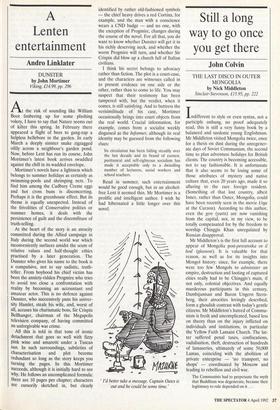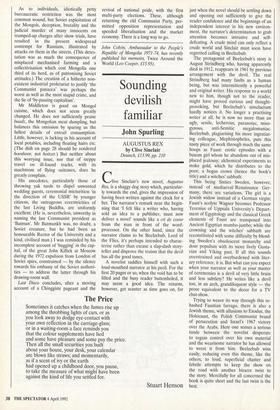Still a long way to go once you get there
John Colvin
THE LAST DISCO IN OUTER MONGOLIA by Nick Middleton Sinclair-Stevenson, £15.95, pp. 222 Indifferent to style or even syntax, not a participle unhung, no proof adequately read, this is still a very funny book by a balanced and sardonic young Englishman. Mr Middleton visited Mongolia twice, once for a thesis on dust during the unregener- ate days of Soviet Communism, the second time to plan adventure holidays for British clients. The country is becoming accessible, not to say fashionable. It is unfortunate that it also seems to be losing some of those attributes of mystery and native culture that, even 20 years ago, made it so alluring to the rare foreign resident. (Something of that lost country, albeit Inner, rather than Outer, Mongolia, could have been recently seen in the movie (Aga at the Curzon). According to this author, even the gers (yurts) are now vanishing from the capital, not, in my view, to be totally compensated for by the freedom to worship Chinggis Khan unregulated by Russian disapproval.
Mr Middleton's is the first full account to appear of Mongolia post-perestroika or it hod (glasnost). It is valuable for that reason, as well as for its insights into Mongol history: since, for example, there were too few Mongols to administer an empire, destruction and looting of captured cities really had to be Chinggis's main, if not only, colonial objectives. And equally murderous participants in this century, Dambijantsan and Baron Ungern Stern- berg, their atrocities lovingly described, form a ghoulish contrast with today's gentle citizens. Mr Middleton's hatred of Commu- nism is fresh and uncomplicated, based less on theory than on the injury inflicted on individuals and institutions, in particular the Yellow Faith Lamaist Church. The lat- ter suffered penal taxes, confiscations, vadalisation, theft, destruction of hundreds of lamaseries, ultimately of some 50,000 Lamas, coinciding with the abolition of private enterprise — 'no transport,' no shops' — coordinated by Moscow and leading to rebellion and civil war.
The Communists had to perpetuate the myth that Buddhism was degenerate, because their legitimacy to rule depended on it ...
As to individuals, idiotically petty bureaucratic restriction was the most common wound, but Soviet exploitation of the Mongols, deception, brutality and the judicial murder of many innocents on trumped-up charges after show trials, have resulted in the present widespread contempt for Russians, illustrated by attacks on them in the streets. (This detes- tation was as much the consequence of misplaced mechanised farming and a collectivisation which cost Mongolia one third of its herd, as of patronising Soviet attitudes.) The creation of a hitherto non- existent industrial proletariat to justify `the Communist panacea' was perhaps the worst as well as the most stupid crime, and the lie of 'by-passing capitalism'.
Mr Middleton is good on Mongol cuisine, which does not seem greatly changed. He does not sufficiently praise buudz, the Mongolian meat dumpling, but balances this omission by sparing us the fullest details of entrail consumption. Little, however, is lacking in his account of local potables, including floating hairs etc. (The dish on page 28 should be rendered hooshoor, not hoitzer.) But neither about this worrying issue, nor that of steppe travel on ill-found tracks, with its maelstrom of flying suitcases, does he greatly complain.
His anecdotes, particularly those of throwing yak turds to dispel unwanted wedding guests, ceremonial micturition 'in the direction of the USSR' by younger citizens, the outrageous eccentricities of the last Living Buddha, are uniformly excellent. (He is, nevertheless, unworthy in naming the last Communist president as `Batman'. Mr Batmunkh was, no doubt, a Soviet creature, but he had been an honourable Rector of the University and a kind, civilised man.) I was reminded by his incomplete account of `bugging' in the cap- ital, of the great John Killick at Moscow during the 1972 expulsion from London of Soviet spies, constrained — by the silence towards his embassy of the Soviet authori- ties — to address the latter through his drawing-room wall.
Last Disco concludes, after a moving account of a Chinggiste pageant and the revival of national pride, with the first multi-party elections. These, although returning the old Communist Party, per- mitted opposition representation and speeded liberalisation and the market economy. There is a long way to go.
John Colvin, Ambassador to the People's Republic of Mongolia 1971-74, has recently published his memoirs, Twice Around the World (Leo Cooper, £15.95).



























































 Previous page
Previous page